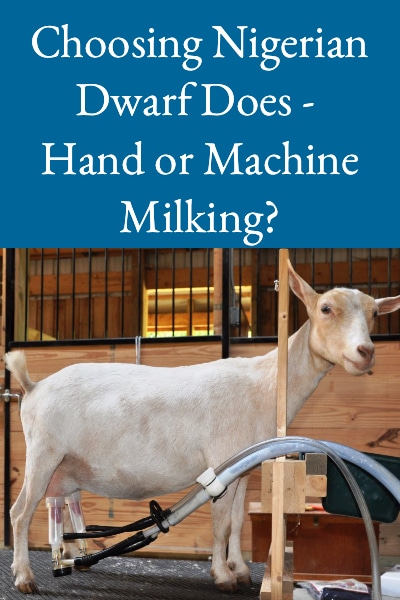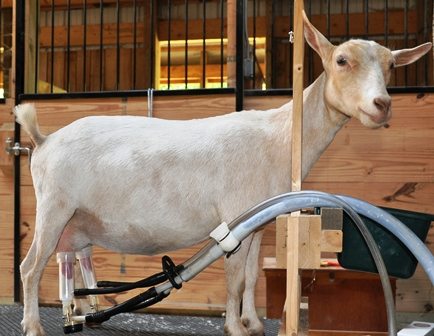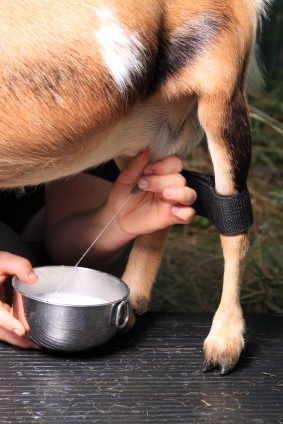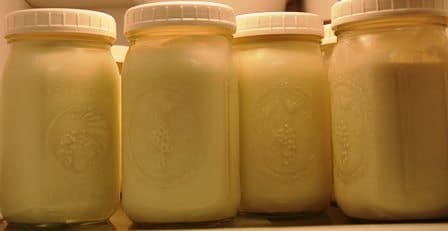When choosing Nigerian Dwarf does (or other goat breeds) for milk, one consideration should be whether you plan to 
When first investigating dairy goat breeds for Bramblestone Farm, my initial assumption was that Nigerian Dwarf goats were too small to machine milk. Because my partner and I were both working full-time, I was hesitant about considering the breed. Although they appeared to be ideal from many other aspects, I was concerned about our ability to milk them.
Then, I attended my first dairy goat show and was shocked when I saw the owner of a nationally recognized herd put a Nigerian Dwarf goat on a milking stand and proceed to machine milk her (see How To Machine Milk Nigerian Dwarf Goats). This breeder had a large string of goats with her at that show and I was amazed at how quickly she milked them. Although I intended to hand milk, the possibility that they could be machine milked may have been the final straw in choosing which breed of goat we would raise on our farm!
This means that Nigerian Dwarf goats can be either hand or machine milked, it just depends on what’s best for your situation. But if you’re choosing does or doelings for your first goats, you should keep in mind what method you plan to use. If you’re planning to machine milk, then the size of their teats and whether they’ve come from a herd that has been bred for hand milking isn’t necessarily a big issue. However, if you’re planning to hand milk, then teat size and hand milking bloodlines are an important consideration.
No one warned me about choosing goats that came from lines bred for hand milking. So, the very first goat I chose had small teats, and she didn’t express her milk easily. It’s difficult to learn to milk a first freshener with those characteristics. If I’d known what to look for then, I probably never would have purchased her. Fortunately, I didn’t and she grew into a conformationally beautiful doe. She easily earned her milking stars, did extremely well in linear appraisal, and was the first of our does to earn her Superior Genetics designation. But we quickly gave up on the idea of hand milking. Also, it explains why I never recommend her daughters to those intending to hand milk.

The story of our first experience just highlights that if you’re intending to hand milk your goats, you should find out if they are from herds that are hand-milked and bloodlines with characteristics that make hand milking easier. Things like larger teat size and easy milk expression can make a big difference. Even though we machine milk, I prefer to select goats from hand milking bloodlines. I know many of our customers do choose to hand milk, and I want to produce kids that will get them off on the right track.

If you’re choosing a doe, obviously you can examine her to determine teat size and ask questions about the milking bloodlines in her pedigree. If the owner hand milks the doe you’re interested in, it would be a good time to get a first lesson in milking her before purchasing her. If it’s a doeling, then doing the same thing with her dam is always a good idea. Dams and daughters often have very similar characteristics when it comes to milking. And when selecting herdsires, remember that they too will determine whether the offspring will have good hand milking characteristics. If milk is one of the reasons you’re considering purchasing Nigerian Dwarf does or doelings, just make sure that their characteristics will fit with your milking plans.

Tina says
Hi there! You have a picture above of hobbles and I was wondering where you got them? I have only found ones that people say will not fit a Nigerian.
Lesa says
Hi Tina, That hobble is a homemade one using Velcro, there is one that I saw here that might work: http://hoeggerfarmyard.com/xcart/Goat-Hobble.html We train them to the milk stand with grain from a young age these days and no longer use a hobble. Sorry I’m not more help.
Amanda says
Great points! I’ve learned to hand milk on a very unwilling Nigerian, but she and I have learned together. 😉 But I’m the ONLY person who can milk her, which makes it tough if I need a break. I’d love to hear more about the machine milkers you use or recommend, though. I’d like to invest in one someday.